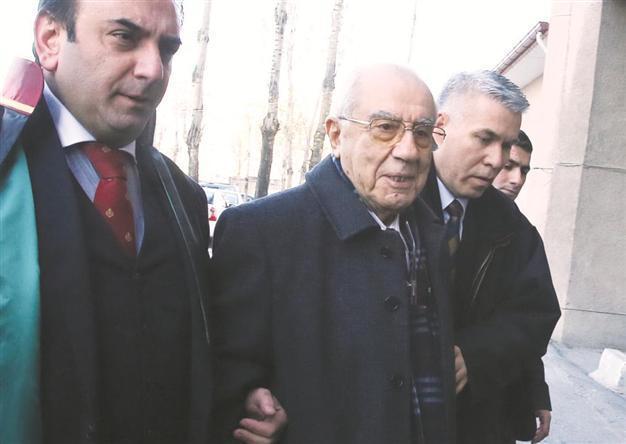Feb 28 was no coup, chief suspect asserts in 1997 putsch case
ANKARA

Retired Gen Karadayı (C) arrives in Ankara to provide testimony. DAILY NEWS photo, Selahattin SÖNMEZ
The prime suspect in the Feb. 28 process, widely known as the “post-modern coup” that unseated Turkey’s first-ever Islamist prime minister, has challenged the notion the military’s actions at the time amounted to a putsch.“This process is by no means a coup process as is said among some circles,” then-Chief of General Staff Gen. İsmail Hakkı Karadayı was quoted as saying by the Anadolu Agency Dec. 12, while acknowledging that there was country-wide tension at the time.
“There is a need to look into the cause-and-effect relation in this tension,” Karadayı said, while strictly denying all charges against him, which he said were “completely groundless.”
Karadayı also suggested that then-Prime Minister Necmettin Erbakan would not have given testimony against the alleged coup-plotters had he not died in 2011.
“Why was this case not opened when the late Erbakan was alive; why did they wait for 16-17 years?” Karadayı asked, suggesting Erbakan would not have spoken against the military in the case into the events.
The Feb. 28 process refers to the harsh army-led campaign that forced Erbakan to resign in June 1997. A Feb. 28 National Security Council (MGK) declaration asked the government to comply with legislation on secularism while giving the government a list of actions to take in regards to the situation.
A total of 103 suspects are being tried on charges of “overthrowing the Turkish government by force” at the trial that began on Sept. 2. Only five suspects, including former generals Çevik Bir and Çetin Doğan, are still being tried under arrest.
In the final indictment sent to the court on May 22, the prosecutors designated then-Deputy Prime Minister Tansu Çiller and then-Interior Minister Meral Akşener as the leading victims in the case.
Karadayı said avoiding involvement in politics has always been a basic principle for him and his colleagues.
“The Armed Forces should always remain out of the politics and should preserve their strength,” he said, arguing that he and his colleagues had never imagined a rule other than democracy.
Karadayı listed certain incidents as factors leading to tension at the time, including Erbakan’s and some lawmakers’ manners and speeches which were “humiliating Turkey’s reputation and encouraging fundamentalist and anti-Republican movements.”
In a bid to justify the Turkish Armed Forces’ (TSK) actions, he recalled “A Minute of Darkness for Continual Light” action, which reached its peak Feb. 15, 1997, with an estimated 30 million participants.
The initial movement was sparked after Sedat Bucak, a parliamentarian; Hüseyin Kocadağ, a police academy chief; Gonca Us, a former beauty queen; and Abdullah Çatlı, a murder suspect wanted by Interpol, were all found in the same car following a random traffic accident in the northwestern Turkish town of Susurluk on Nov. 3, 1996. The discovery raised questions about connections between the state and mafia and prompted protests in which people switched off their lights at 9 p.m. to demand authorities shed light on the dark, inner workings of the state.
“An idea of coup has never born by using negative incidents as a pretext. On the contrary, the [problem] was resolved through constitutional bodies,” Karadayı said.
















